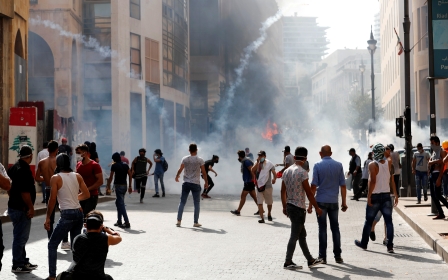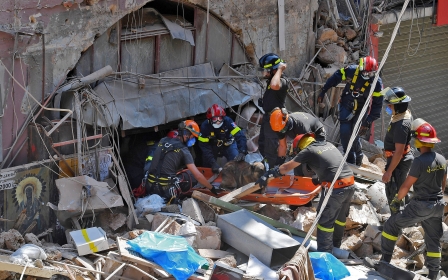Beirut explosion: Second minister resigns in wake of protests

The environment minister resigned on Sunday from Prime Minister Hassan Diab's government, saying that the government had lost a number of opportunities to reform.
"In light of the enormous catastrophe … I have decided to hand in my resignation from government," Damianos Kattar announced in a statement, saying that he had lost hope in a "sterile regime that botched several opportunities".
Kattar was the second member of the cabinet to quit, following the resignation earlier on Sunday of Information Minister Manal Abdel Samad in the wake of the explosion that rocked Beirut on Tuesday.
"After the enormous Beirut catastrophe, I announce my resignation from government," Samad said in a statement on Sunday, apologising to the Lebanese public for failing them.
She cited the failure of the government to carry out reforms in addition to the catastrophic explosion that killed more than 150 people and wounded over 6,000.
New MEE newsletter: Jerusalem Dispatch
Sign up to get the latest insights and analysis on Israel-Palestine, alongside Turkey Unpacked and other MEE newsletters
On Sunday, protesters in Beirut clashed with security forces for the second evening running. Police fired tear gas in an attempt to disperse demonstrators hurling stones and shooting fireworks on a street leading to the parliament building.
Tuesday's blast, which was felt as far as the island of Cyprus, more than 250km away, was recorded by the sensors of the American Institute of Geophysics (USGS) as having the power of a magnitude 3.3 earthquake.
It was triggered by a fire in a port warehouse, where a huge shipment of hazardous ammonium nitrate, a chemical that can be used as a fertiliser or as an explosive, had languished for years, according to authorities.
The revelation that the chemicals had been like a ticking time-bomb in the heart of the capital for so long has served as shocking proof to many Lebanese of the rot at the core of the state apparatus.
Demonstrators on Sunday called for renewed anti-government rallies after a night of angry protests saw them storm several ministries before they were expelled by the army.
It was a new tactic for a protest movement that emerged last October to demand the removal of a political class long accused of being inept and corrupt.
"The explosion in the port left a crater 43 metres deep," the Lebanese security official told AFP, citing assessments by French experts working in the disaster area.
That compares with the crater left by the enormous blast of the suicide-truck bomb that killed former prime minister Rafic Hariri in 2005, which measured 10 metres across and two metres deep, according to an international tribunal investigating his murder.
French rescue and police teams are among a large group of international emergency response specialists that has flooded into Lebanon to ease pressure on local authorities unable to cope with the disaster relief alone.
Qatari, Russian and German rescuers are also working at the port blast site.
The Lebanese army said on Sunday that hopes had dwindled of finding survivors.
"After three days of search and rescue operations, we can say we have finished the first phase, which involved the possibility of finding survivors," Colonel Roger Khoury told a press conference.
"As technicians working on the ground, we can say we have fading hopes of finding survivors," he added.
At least 21 people remain missing, according to the health ministry.
Church calls for resignation
The head of Lebanon's Maronite church, meanwhile, called on the entire government to step down over the 4 August explosion.
Maronite patriarch Bechara Rai joined the chorus of people pressing Prime Minister Hassan Diab's cabinet to step down over a blast he said could be "described as a crime against humanity".
"It is not enough for a lawmaker to resign here or a minister to resign there," Rai said in a Sunday sermon.
"It is necessary, out of sensitivity to the feelings of the Lebanese and the immense responsibility required, for the entire government to resign, because it is incapable of moving the country forward."
Rai echoed calls made by Prime Minister Hassan Diab on Saturday for early parliamentary polls - a long-standing demand of a protest movement that began in October, demanding the removal of a political class deemed inept and corrupt.
He also joined world leaders, international organisations and the angry Lebanese public by pressing for an international investigation into the explosion.
President Michel Aoun on Friday rejected calls for an international investigation, which he said would "dilute the truth".
Under increased pressure from the street and foreign partners exasperated by the leadership's inability to enact reforms, Diab's government is fraying at the edges, with at least six lawmakers having quit since the explosion.
Just a day before the blast, it was announced that Nassif Hitti had quit as foreign minister, warning in his resignation letter that Lebanon "is sliding towards becoming a failed state".
Diab said he would introduce a law calling for early elections and would remain in office for two months until major parties reached agreement. The most recent general election was held in May 2018.
Middle East Eye delivers independent and unrivalled coverage and analysis of the Middle East, North Africa and beyond. To learn more about republishing this content and the associated fees, please fill out this form. More about MEE can be found here.





